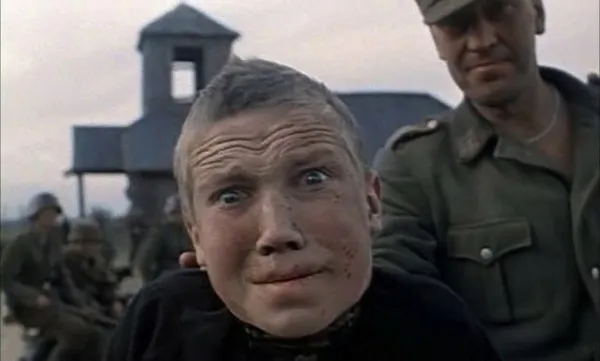Eye For Film >> Movies >> Come And See (1985) Film Review

"Decimation", at least in its original sense, denotes the reduction of a population by one tenth; yet for all its horrifically clinical precision, this word is barely adequate, either in human, or even mathematical terms, to describe what happened to the people of Belorussia under German Occupation during the Second World War, when 626 villages were systematically burnt to the ground, along with their inhabitants, and one person in four was killed. This 20th century act of genocide has rarely received much attention; after all, its survivors tended to be reticent about the still smouldering embers of their experience and Belorussia was soon kept hidden behind the Iron Curtain and there were other Holocausts that had entered the public consciousness.
All this was to change in 1985, with the release of Elem Klimov's incendiary Come And See (Id i Smotri). Named after a passage from the Book of Relevations, invoking all to "come and see" the hellish ruin of the Apocalypse, the film bears grim testimony to Belorussia's outrage, as witnessed by a young boy who, like the co-writer Ales Adamovich, lives through the suffering.

Florya (Alexei Kravchenko) digs up a rifle and, against the warnings of his uncle and mother, tries to join a guerrilla band of anti-Fascist partisans. Their leader Kosach (Liubomiras Lauciavicius), recognising Florya's innocence, leaves the boy and a beautiful girl named Glasha (Olga Mironova) behind in the forest camp; but in no time Nazi soldiers, dropping in by parachute, violate this idyll and the couple is forced to flee for their lives, their childhood paradise lost forever. In the picaresque mayhem that follows, Florya sees, and miraculously survives, horror upon horror, in a brutal rite-of-passage to premature adulthood, madness and inconsolable anguish.
Occupying territory somewhere between Ivan's Childhood (1962) and Fateless (2005), Come And See is an intimate epic, in which all the promise of adolescence is perverted by war. Florya's harrowing journey, encapsulating the woes of an entire nation, is depicted as an infernal, at times surreal, nightmare where heroics are short-lived and victories hollow.
Klimov exercises relative restraint in portraying the cruelty and carnage, to which Florya becomes an unwilling witness, but its impact on his psyche can be measured in the repeated close-ups on the boy's traumatised face, which seems to distort and age dramatically from one scene to the next in Kravchenko's extraordinary, agonised performance. Glasha undergoes a similar transformation, at first so luminous that the very sight of her makes Florya literally fall over, but by the end reduced to an almost zombie-like state by rape, hunger and despair.
Thanks to Alexei Radionov's mobile camerawork, some jarring transitions in Valeriya Belova's editing and Oleg Yanchenko's discordant layering of musical drones upon background noise, Come And See conveys something of the physical and mental dislocation that war brings to ordinary lives. Each shot is composed with a poetic beauty, reminiscent of Tarkowsky at his best, but as the Nazi brutalities, at first merely suggested, become more and more explicit, culminating near the end in an orgy of murder, the film shifts from being haunting and unsettling to just plain upsetting, before finally posing some difficult moral questions on the differences between humanity and bestiality.
Come And See is, along with Apocalypse Now (1979) and The Thin Red Line (1998), one of the finest films ever to have been made on the subject of war. Awful in the very best sense of the word, it is full of strange, horrific imagery that is all too unforgettable.
Reviewed on: 25 May 2006

















